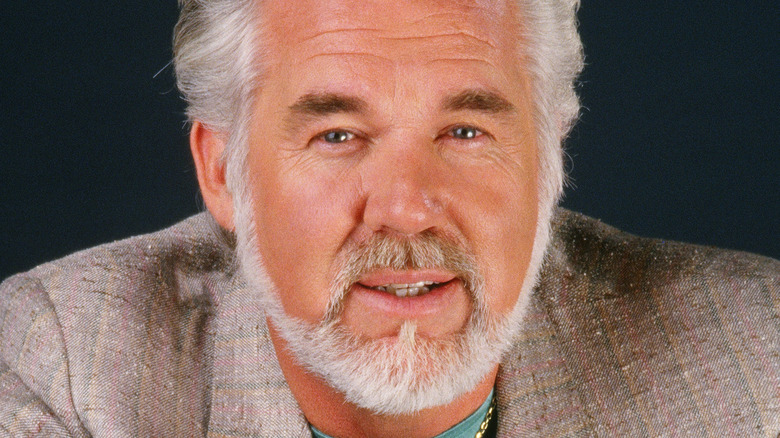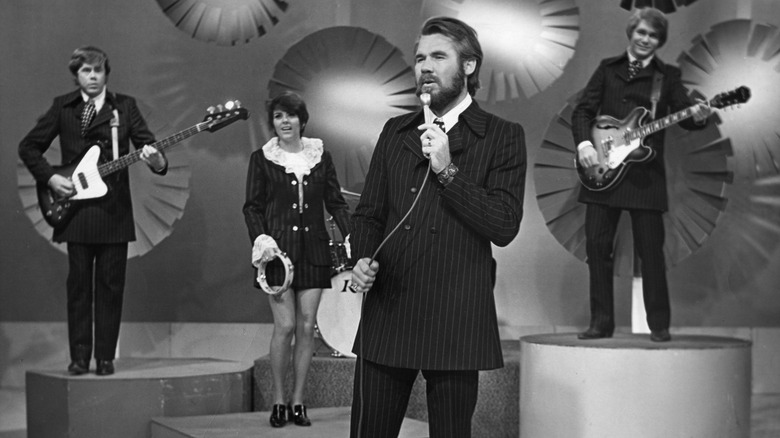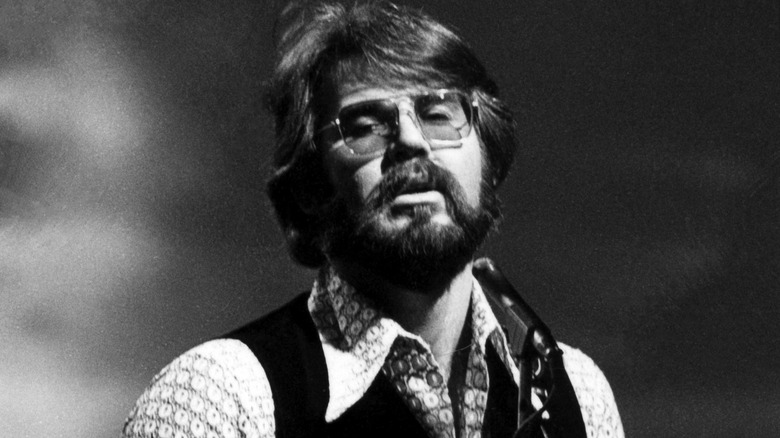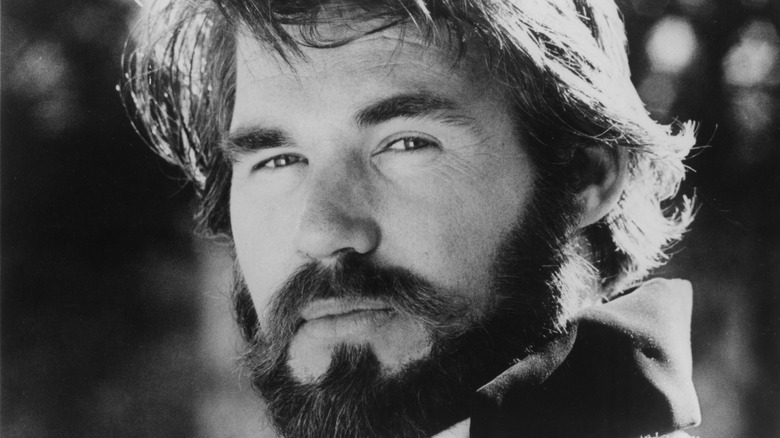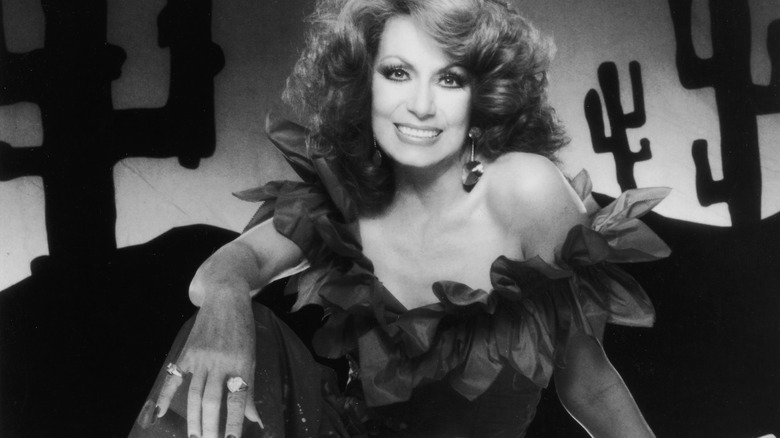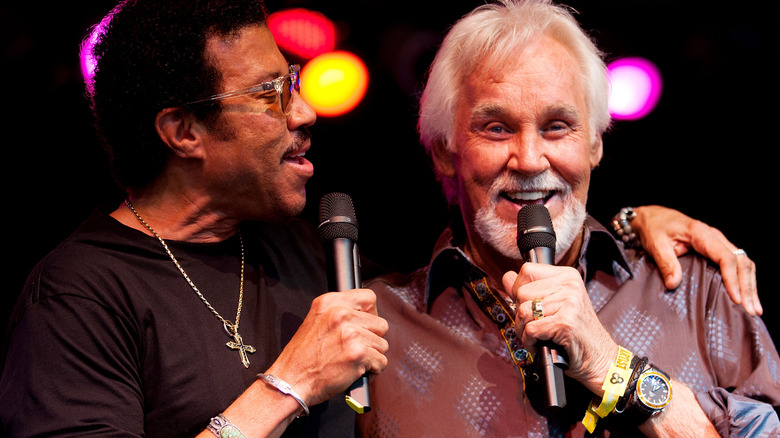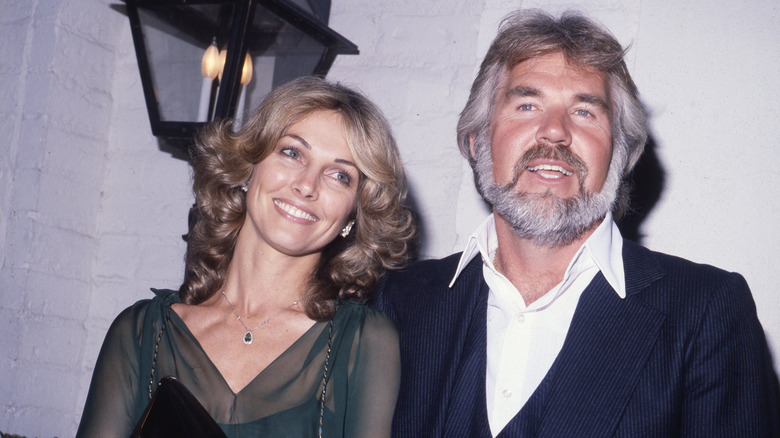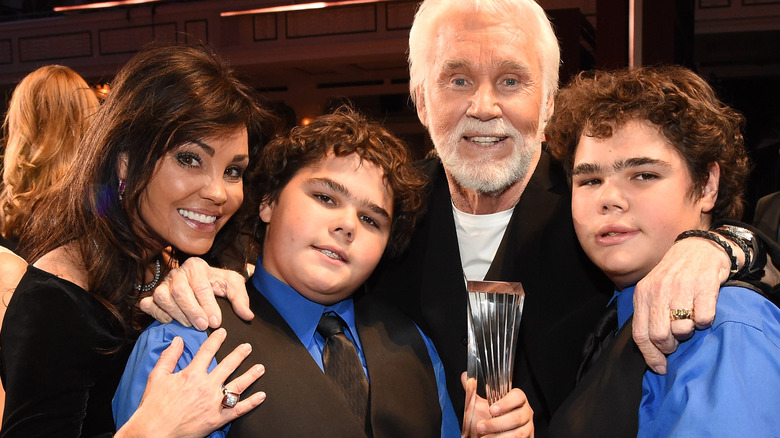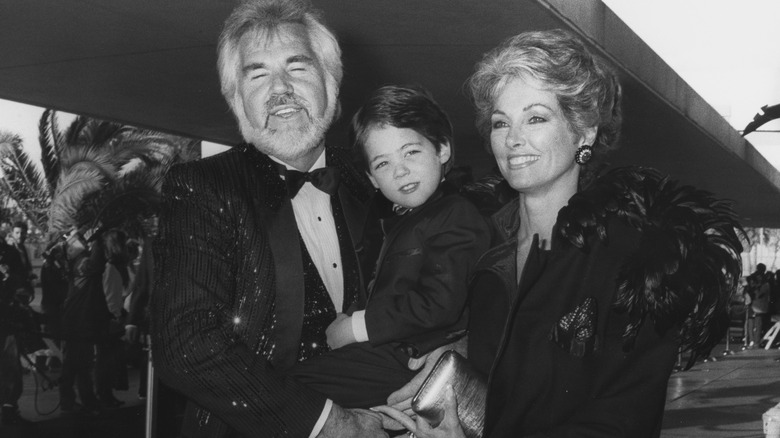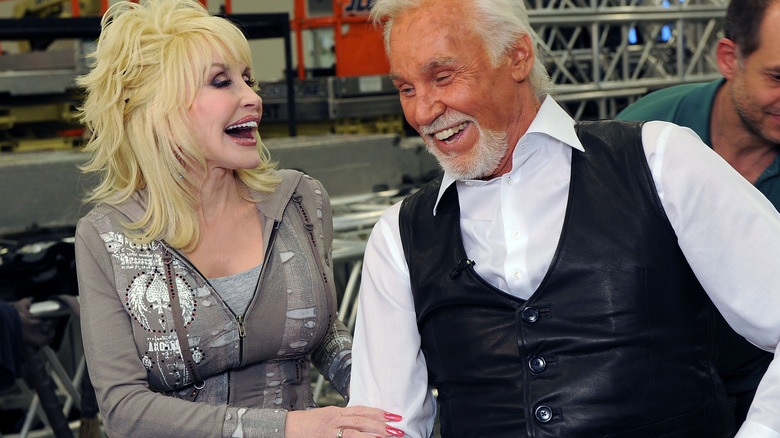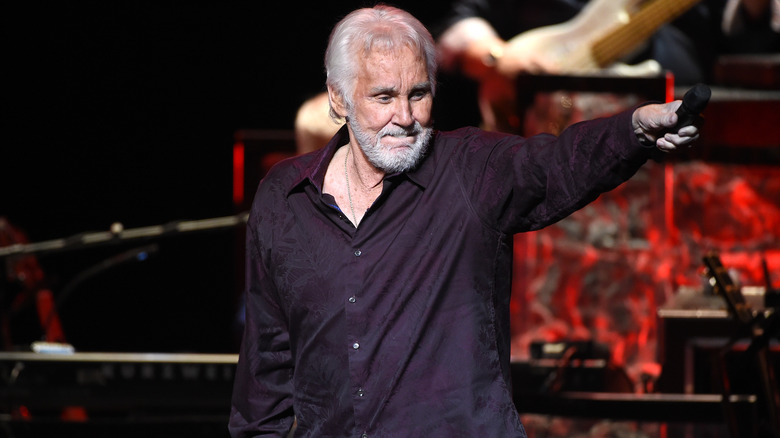Tragic Details About Kenny Rogers
There are two kinds of people in this world: The kind that say they're fans of Kenny Rogers, and liars. There are few musicians as iconic as the man born Kenneth Donald Rogers — and, says Biography, oddly called Kenneth Ray by his family.
He knew early on that he wanted to be a musician, but it took a long time for the details to work themselves out. His earliest forays into music were with a rockabilly group, then he switched to jazz. (Right? Kenny Rogers jazz — with the Bobby Doyle Trio — is a thing that exists.) It wasn't until the late 1960s that his First Edition came along with the sound that would just work so darn well with "The Big Lebowski" a few decades later. Then, it was on to country, to duets, and to genre-breaking hits like "Lucille" and "The Gambler." He's perhaps best known for his duets, the soul-string-tugging songs done with pop stars like Sheena Easton and Kim Carnes, along with his best actual friend, national treasure Dolly Parton.
Rogers retired from performing in 2018, after being forced to cancel a series of tour dates. When he passed away in 2020, the world remembered once again how much he had contributed to music history. Along the way, though, it wasn't all smooth sailing — so let's talk about some of the tragedies that shaped the man behind one of music's most iconic voices.
Kenny Rogers had a difficult childhood
Some friendships are serious goals, the one between Kenny Rogers and Dolly Parton: Long the subject of rumors and suggestive comments, they always maintained they were simply friends. According to The Washington Post, one of the things they bonded over was their shared religious beliefs, and their difficult childhoods.
Rogers, says the Houston Press, grew up in Houston's Fourth Ward. Tensions were constant: The San Felipe Courts housing projects that Rogers grew up in had been built for white families, and they came at the cost of displacing families of color. The fourth of ultimately eight children, Rogers was the son of a carpenter/amateur musician and an office cleaner/hospital worker (via ABC), and his siblings have spoken about how difficult it was. "We were poor, there's no doubt about that," his brother, Roy, told People. His sister, Sandy, added: "We struggled, you know, but we had faith that we would make it through."
Financial difficulties aside, the Rogers family has spoken about the sense of community they shared with their neighbors. When Rogers made it big, it wasn't a case of never looking back — he made it a point to repay kindnesses he remembered for years. It was the 1970s when he got word that a former neighbor was short the $600 she needed to get her car running again, so he sent her $20,000, instructions to get a new one, and a note that read: "Thank you for helping me pay my rent years ago."
His father struggled with addiction
Kenny Rogers released his memoir, "Luck or Something Like It," in 2012. In it, he spoke candidly about some pretty difficult things, including his father's struggles with alcohol. He explained to Reuters that seeing his father's drinking habits and the consequences that came with it was what convinced him to stay sober for his entire life — along with a worry that he had a genetic predisposition to addiction, and risked following his father down the same path. With that, though, came some pretty heavy regrets. "I never really got to know why my dad drank. He was an alcoholic, but during that time, post-World War II, a lot of people were unemployed and ended up drinking. He couldn't really support his family, and I think it just broke him down. It breaks my heart that I didn't know that before he passed away."
Proving once again that he was a lemons-to-lemonade kind of person, Rogers also wrote (via The Boot) that his own experiences with alcohol and drugs are what made him both take up photography — to have something else to fill the time in between the music — and defend those who find themselves struggling with addictions: He experienced it, firsthand.
If you or anyone you know is struggling with addiction issues, help is available. Visit the Substance Abuse and Mental Health Services Administration website or contact SAMHSA's National Helpline at 1-800-662-HELP (4357).
Kenny Rogers was told he was too old
Kenny Rogers grew up surrounded by music: According to The New York Times, all of his siblings and most of his extended family played an instrument, and music was a part of everyday life. Still, when he spoke with Rolling Stone in 2014, he admitted that it hadn't been an easy road to stardom, and by the time he set out on his own, he had a major roadblock in his way.
It was Steve Wynn who told Rogers he was going to fire him, because he could absolutely go on to bigger and better things. Rogers stayed for the rest of his contract, though — playing in a Las Vegas lounge that held around 600 people — and when he started trying to get a record deal, he says the answer was always the same: "the record company didn't want me because I was too old. I was between 35 and 40, and they'd say, 'He's too old for country music!'"
That only changed with the help of a producer named Larry Butler, and when Rogers won a Grammy for "Lucille," Butler was one of the people he thanked.
He lost his good friend to a tragic car accident
Kenny Rogers frequently partnered with singer Dottie West, and together, they released several albums and a number of major hits, including "Every Time Two Fools Collide” and "Anyone Who Isn't Me Tonight." Country Music Family adds that they weren't just partners in music, they were extremely good friends outside of the studio, too. Rogers would sadly be one of the last people to see her before she was killed in a car accident.
West went through a divorce and bankruptcy in the early 1990s, and was trying to get her career and her life back on track. She had help from Rogers, says The Boot, who gave her a car. She was driving that car while on her way to The Grand Ole Opry on Aug. 31, 1991, and when it quit on her, she called her neighbor to pick her up and get her to the venue. Her neighbor picked her up, but in his rush to get her there on time, ended up crashing into a freeway divider. West suffered massive internal injuries, and died just a few days — and several operations — later.
Rogers told Rolling Stone in 2014 that one of his life goals was seeing that she got the recognition she deserved, and was inducted into the Country Music Hall of Fame. Four years later, she was, and he posted congratulations to "my friend, the late (very) great Dottie West" on his Facebook page.
Kenny Rogers had to go to court over payment for digital sales
It might be nice to think that whenever someone purchases some music, the artist gets paid. That would happen in a perfect world, but in 2012, Kenny Rogers had to go to court to try to get royalties from his own music. According to The Hollywood Reporter, the lawsuit was filed against Capitol Records and said that artists should be getting 50% of the revenue made from online sales. (Rogers wasn't alone in this — other class-action lawsuits were filed by big names, too, like the Allman Brothers, Rob Zombie, and Sister Sledge.)
The lawsuit brought a huge problem to light, and it was a big deal: Industry experts estimated that across the board, it could mean somewhere around $2.15 billion hadn't gotten into the hands of artists who deserved it — and that was just the sales from iTunes. The claim filed by Rogers alleged that Capitol had shorted him around $400,000 worth of profits from digital downloads of his music, and that attempts to settle it directly with the company had failed.
The issue has been ongoing: In 2020, Hayleigh Bosher, a senior lecturer in Intellectual Property Law from Brunel University London said (via The Conversation) that although streaming music raked in profits of more than £1 billion (or $1.3 billion USD) in the past year and in the UK alone, the annual payout for eight out of 10 artists was under £200, or around $250 USD.
He felt he had failed as a husband
When Kenny Rogers released his 2012 autobiography "Luck or Something Like It," he wrote about his five marriages. At the time, he had been married to his fifth wife, Wanda, for 15 years: He said that he had learned a lot from the previous marriages. And, he added, he blamed himself for them falling apart. "When I became driven and selfish, I was so intent to follow my life that it cost me," he told Reuters. "... every woman I married, I really loved when I married her. And I don't blame them for the marriage falling apart. I blame myself and my chosen field of music."
Rogers got married for the first time to then-girlfriend Janice Gordon. He was 19 and she was pregnant, and just a few months after his divorce, he kicked off what would be a 3-year marriage to Jean Rogers. He was then married to Margo Anderson from 1964 to 1976, Marianne Gordon (pictured) from 1977 to 1993, and finally married Wanda Miller in 1997.
It was Marianne Gordon who explained the sad end of their marriage to Closer Weekly, saying that although "his total focus was on me," she said that he struggled with the idea that his career was failing. "He felt this craving, this longing. He said he felt like he was having a mid-life crisis." According to the Irish Independent, Gordon received a settlement of around $60 million in their divorce.
Kenny Rogers was candid about being an older father
When Kenny Rogers got married for what would be the final time, it's safe to say the match raised some eyebrows. As he told Fox News, she was 28 years younger than him, and her parents — who were two years younger than him — had been vocal about their disapproval. At first. Two decades into the relationship, he was still saying "She is truly my soul mate," and that he was grateful to say she was the mother of two of his children.
When Rogers announced his retirement in 2015 (via the Tennessean), he was the 77-year-old father of 11-year-old twin boys. The reason was a combination of things, including difficulties with mobility, and wanting to spend more time with his kids.
He had already told the Irish Independent that he knew how it sounded, and said that when they were talking long-term, they had agreed they weren't going to have kids. That changed when she turned 31, and when she wanted children, he said that he agreed: He didn't want her to ever regret her relationship with him, and not having children. When asked about his age, he said, "Someone will be talking about his or her child going to college and it breaks my heart. And that was the reason I didn't want children again. Because I knew I wouldn't be there at the prime of their lives."
He felt he failed his children as a father
Raising kids is tough, and that's true for everyone — even Kenny Rogers. When he spoke to the Irish Independent in 2006, he said that being a father to his twin boys was what he was best at ... but acknowledged that he had made some mistakes along the way, before he figured out what he considered most important in his life.
Rogers's daughter, Carole Lynn, was born in 1958. Rogers married her mother when they discovered she was pregnant, and after the divorce and in spite of efforts at reconciliation, they remained estranged as Rogers says (via Fox News) he stepped out of the way so as to not disrupt her relationship with her stepfather. He was estranged from his son Kenny Rogers Jr. (from his third marriage) as well, notes Outsider, but after divorcing the mother of his son, Christopher (pictured), he promised to always be his father — even if they didn't get to see each other much.
When explaining his retirement, he explained his regret (via The Daily Mail): "I have two older boys, and I didn't get to spend this time with [them], and I resent it. My [younger] boys are playing football this year, and we went to watch a game and they were so excited about us being there, and that's the kind of thing that as a parent, you want to be part of as much as you can."
His foray into the restaurant industry didn't go as planned
While Kenny Rogers will undoubtedly continue to be remembered for his music, there's a business venture he set out on in 1991 that sadly didn't go exactly as planned. That's the establishment of Kenny Rogers Roasters, a restaurant chain that Vice says was meant to be an alternative to what was then called Kentucky Fried Chicken. The idea was that instead of having to reach for the fried chicken, the chain was going to offer fresh rotisserie chickens and corn muffins. Sounds pretty delicious, right? What happened?
In spite of the fact that rotisserie chickens hit peak popularity at the time — and that they got a mention on "Seinfeld" — the chain was plagued with problems. That started just the year after they opened, and trouble came in the form of a $10 million lawsuit filed by a company claiming that the chain had copied their concept. Rogers's restaurant ended up buying out the little guy, but by the time that happened, they had more competition that ended up being too much to handle.
Kenny Rogers Roasters ended up being around for just a few years before bankruptcy hit. In 1998, the company was sold, and Rogers both got out and made it a point to distance himself from the restaurants that still bore his name. Surprisingly, there's a lot of them: there's around 200 in southeast Asia.
Kenny Rogers passed away in 2020
By the time Kenny Rogers announced his retirement in 2017, he had been performing for 60 years. Sadly, he didn't get much time to enjoy that retirement: Rolling Stone reported that he died on March 20, 2020. No specific cause was given, with representatives stating that he "passed away peacefully at home from natural causes under the care of hospice and surrounded by his family." They did, however, note that he had been struggling with mobility issues in recent years.
Tributes came pouring in, and perhaps none were as moving as the one from Rogers's longtime friend, Dolly Parton. She said in a video posted to Twitter: "I loved Kenny with all my heart, my heart's broken, and a big ol' chunk of it has gone with him today."
Because Rogers's death came during the COVID-19 pandemic, the funeral was limited to a small and private service, with promises of a public celebration to follow as soon as it was safe to do so.
He died with a lawsuit in progress
When Kenny Rogers announced his retirement, he did so with this sentiment (via Variety): "I didn't want to take forever to retire. I've thoroughly enjoyed this opportunity to say farewell ... [and] I could never properly thank [fans] for the encouragement and support they've given me throughout my career and the happiness I've experienced as a result of that." And that's what makes it even more heartbreaking that at the time of his death, Rogers had a lawsuit in progress against a former friend and employee named Kelly Junkerman.
News of the lawsuit was broken by TMZ, and it involved video footage of the farewell tour. Rogers reportedly had given Junkerman permission to film during the tour, but the footage wasn't supposed to be released. Until, the lawsuit claims, Junkermann did release it, in the form of a DVD called "Kenny Rogers — The Gambler's Last Deal."
The lawsuit was looking for a legal ruling in favor of preventing the footage from being shared, and $290,000 in damages. Experts from O'Loughlin Law Firm, LLC suggest that part of the reason for the swift action blocking the release of the DVD is so that the estate can release an official version, one that they don't want to be confused with Junkermann's. Presale links to the video are still circulating, but sales continue to be shut down.
